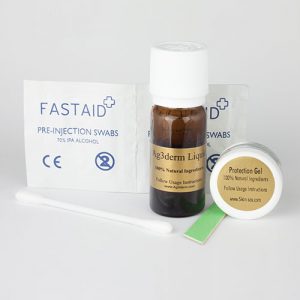If you suffer from irregular pigmentation, avoid sun exposure, as pigmentation problems are most commonly caused by sun damage. Pigmentation problems such as freckles, sun spots and other irregularities are caused by prolonged exposure to the sun as a result of the sun’s UV rays. Avoid the sun between 10am and 3pm, as these hours present the most risk of harmful UV exposure. If you need to go into the sun, dermatologists recommend the use of broad-spectrum UVA/UVB SPF30+ sunscreen, which you should reapply regularly. Avoid tanning salons, as the use of tanning beds will have similar consequences to natural sun exposure. If you have recently had microdermabrasion, laser treatment, IPL therapy, LED light therapy or chemical peels, be extra careful to avoid sun exposure. These treatments heighten your risk of pigmentation problems occurring due to sun damage. Allow time for the layers of you skin to heal before risking sun exposure.
Avoid using products that might irritate the skin, such as products containing fragrance, dye alcohol and lanolin. Avoid using abrasive cleansers that can irritate the skin and make the skin more susceptible to discoloration problems. Some people find that exfoliates work well to overcome pigmentation problems, but be aware that everybody’s skin reacts differently, and if you notice skin irritation, discontinue use of the product to blame. Avoid using bleaching creams that contain chemicals such as hydroquinone, alpha-hydroxy acids and tretinon to treat your pigmentation problems. While they are marketed very well, these creams can be harmful to your skin and may result in further pigmentation problems. Avoid any products containing mercury or steroids.
Some medical treatments for other conditions may affect your skin coloration. A product containing cortisol, for example, which is used to treat skin complaints such as eczema, have been known to bleach the skin – this is known as hypopigmentation. Before beginning any new medication, discuss your concerns with your physician or pharmacist to ensure that the treatment will not cause unwanted skin pigmentation. If you are currently using medication it might pay to consult a professional to ensure the medication does not have side effects for the pigmentation of your skin.

